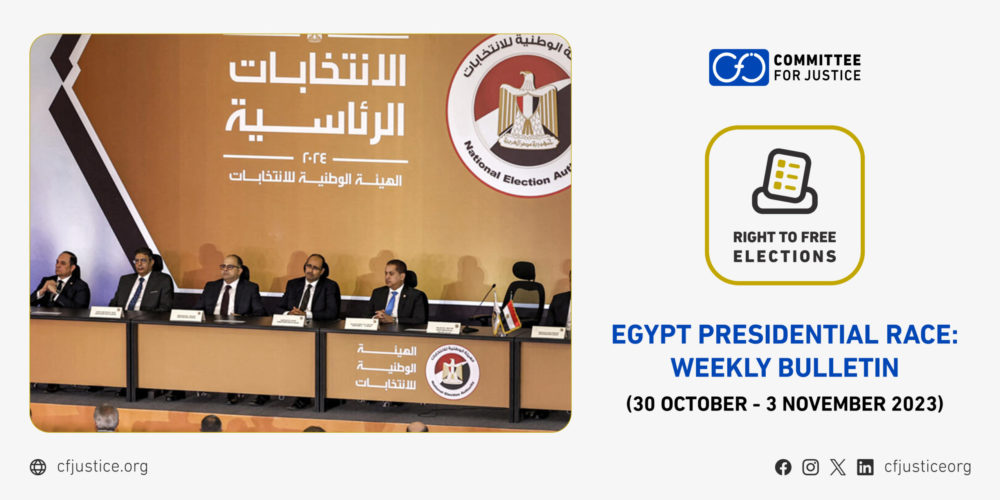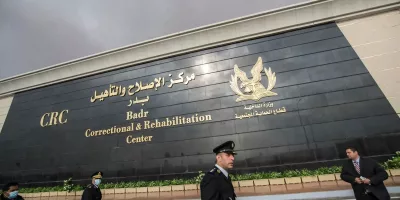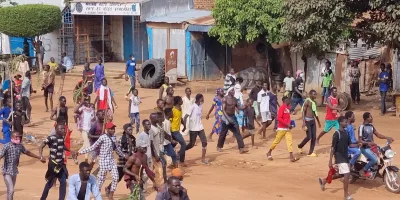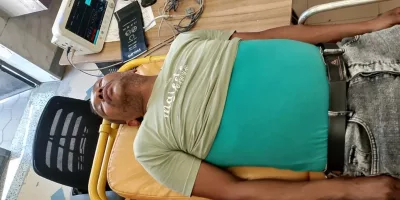The briefing below by the Committee for Justice (CFJ) covers the third week of the Egyptian presidential election campaign, from October 30 to November 3, 2023. The briefing is part of CFJ’s presidential election monitoring project, titled the Right to Free Elections, launched during the first phase of the presidential elections, as part of the approach to monitor and document violations in the human rights and political arena, aiming to ensure transparency, accountability, and empower citizens to exercise their civil and political rights.
The third week of the election campaign witnessed the continued dominance of the incumbent president Abdel Fattah al-Sisi’s campaign as opposed to the crackdown on the campaign of his rivals.
CFJ documented the extension of the detention of 21 defendants, members of the campaign of the former candidate Ahmed Al-Tantawi, including 3 women. They are charged with being allegedly linked to a terrorist group in a case known as “Parallel Popular Powers of Attorney.” Only two individuals were released due to a lack of connection with the case. Meanwhile, the authorities continued their aggressive attacks against rival election campaigns. In the Second Montaza neighborhood of Alexandria Governorate, banners of presidential candidate “Farid Zahran” were torn apart, and electricity was cut from the conference hall where he was meeting with supporters, as reported by the Egyptian Democratic Party.
Meanwhile, the lawyer and human rights defender, Khaled Ali, published the names of 56 individuals who were arrested on charges of participating in protests in solidarity with Palestinians in Gaza, outside the framework of the rallies organized and orchestrated by the security authorities to support President Sisi. The authorities detained them on October 30 in Alexandria in case number 2469/2023, and on November 1 in Cairo in case number 2468/2023.
The role of local and international organizations tasked with overseeing the elections is noticeably absent from the scene. Despite the civic movement urging the National Election Commission to implement “more serious safeguards” for the election’s integrity in September, there was no subsequent endorsement from local election-monitoring organizations that had received formal approval from the authority to oversee the electoral process. This raises concerns about the professionalism and impartiality of these organizations.
Although Mohamed Mamdouh, Chairman of the Board of Trustees of the Egyptian Youth Council and Chairman of the Economic Committee of the National Council for Human Rights, stated that 10,000 observers will monitor the elections nationwide, it is not anticipated that their stance will deviate from that of the Supreme National Electoral Commission. In other words, it is not expected that the authorized organizations overseeing the elections will engage in genuine scrutiny that challenges the narrative imposed by the authority on the media, judiciary, government agencies, and security authorities.
The National Electoral Commission allowed appeals for ten days, from October 29 to November 7. With the appeal period limited to October 27 and 28, the Commission has officially stated that no objections have been filed during the previous period. Consequently, electoral codes are currently being selected in preparation for the completion of the election campaigns, as presumed.






